What's New in 2021.2?
Seq 2021.2 extends Seq's built-in query language with the new DatePart() and OffsetIn() functions.
Seq 2021.2 uses .NET 5.0.4, which addresses a remote-code-execution vulnerability in .NET 5.
For detailed release contents, see the GitHub milestone. Seq 2021.2 also rolls up the final Seq 2021.1 patch release; see also the 2021.1.5424 milestone.
What's new in 2021.1?
Seq 2021.1 includes:
- Collapse all is now an option on nested objects in event properties
- OpenID Connect and Azure Active Directory authentication now work properly under Kubernetes ingress paths
- The dashboard Save button now enables immediately when typing in the query editor
- Seq 2021.1 uses .NET 5.0.2, which addresses a denial-of-service vulnerability in .NET 5
- Various query parsing and translation bugs have been fixed
seqcli user createnow applies user roles correctly from the command-line
For detailed release contents, see the GitHub milestone.
What's new in 2020.5?
Seq 2020.5 is the first Seq version to run under .NET 5, bringing further improvements in execution time for some fundamental queries:
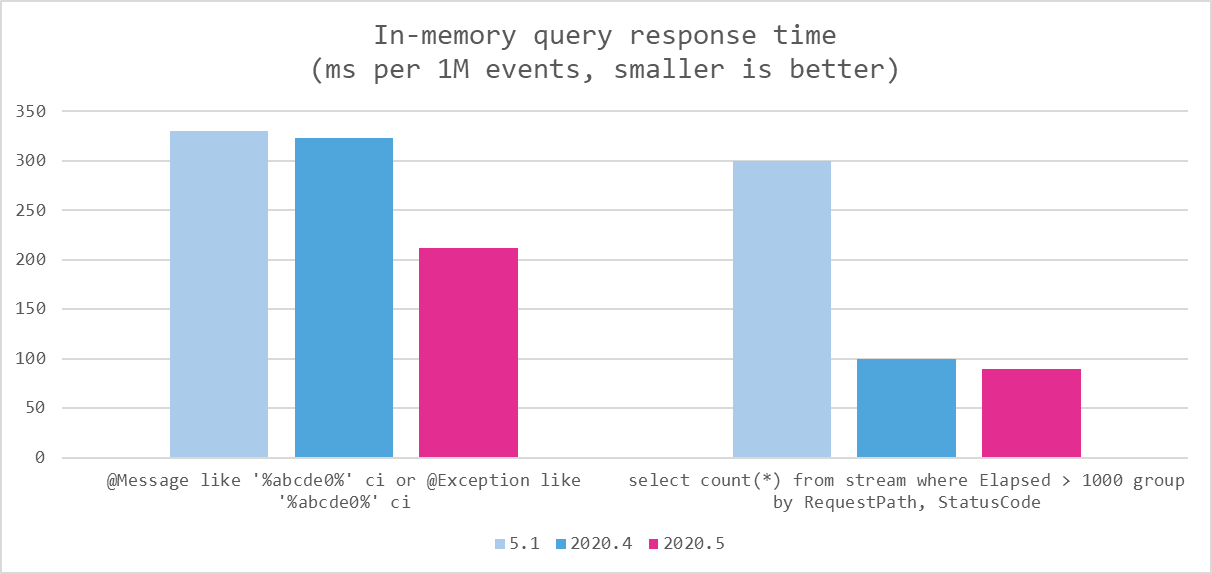
Seq 2020.5 query performance against 2020.4 and 5.1, with data served from memory and from/to dates specified.
In 2020.5, Seq plug-in apps and inputs run under the open-source seqcli app host, making development easier and cross-platform deployment more reliable.
We've also managed to save some bytes to shrink the Windows installer (34%) and Docker image (16%, compressed).
Oh, and workspaces have been redesigned: you can now associate default signals with a workspace, and they'll be activated when you switch between workspaces 😎.
For detailed release contents, see the GitHub milestone.
For additional upgrade instructions, see the Upgrading guide.
What's new in 2020.4?
Seq 2020.4 is all about the Storage screen — see exactly where disk space is going, and how effective retention policies are at freeing up resources.
You can find it under Data > Storage.
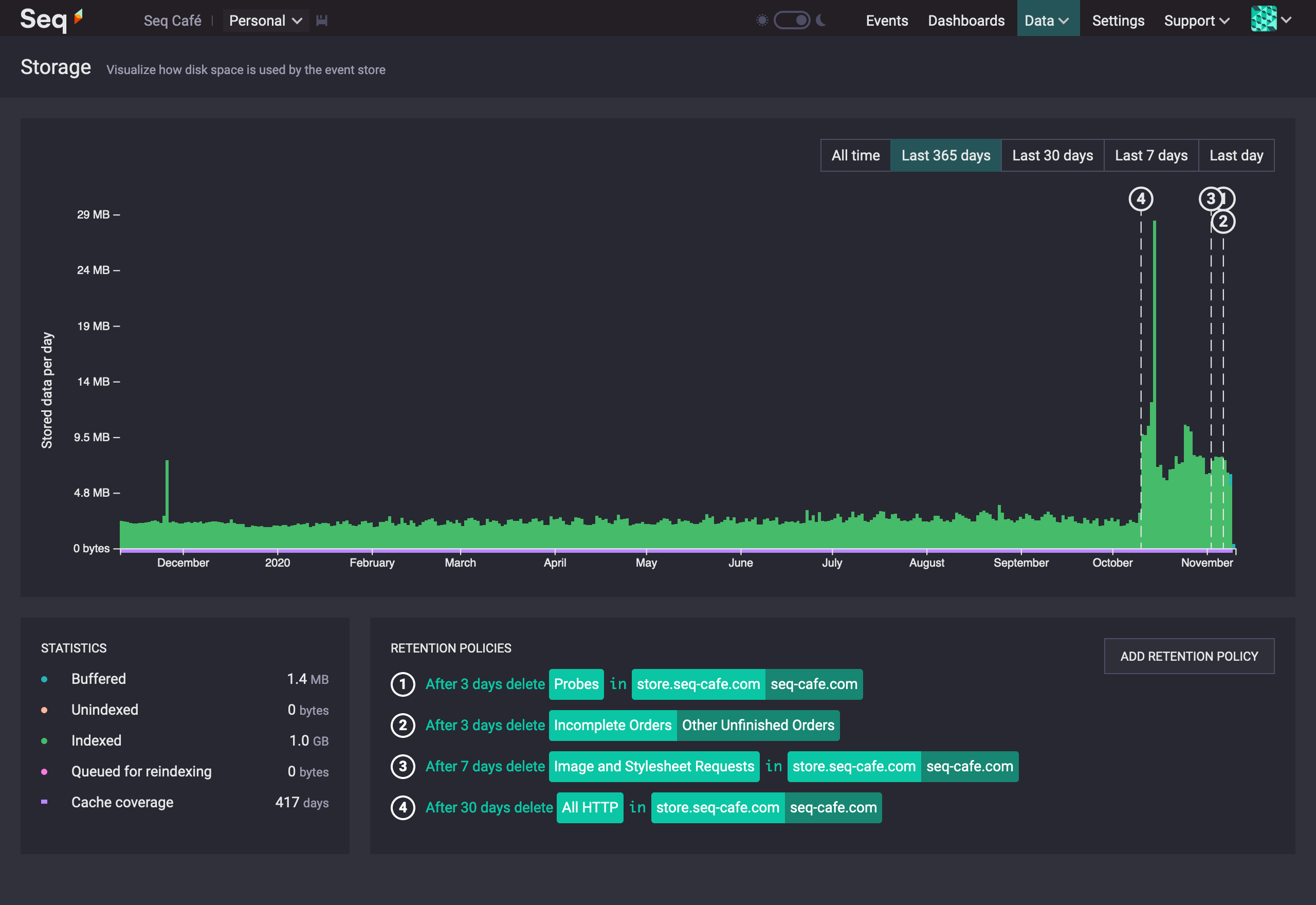
Seq 2020.4 storage view, showing retention policy markers.
The Settings > Users list is also now fully searchable (a relief for customers with hundreds of active users!); dark and light modes can be set to follow your operating system's dark/light setting; all queries are now fully cancellable; entire events can be easily copied as JSON; and, as always, there's a host of other small fixes and improvements.
For detailed release contents, see the GitHub milestone.
What's new in 2020.3?
Seq 2020.3 fixes a number of issues, and improves stability for customers using Azure Active Directory (AAD) authentication. We've also made some much-anticipated changes to live tailing to make live log streams more responsive and easier to follow.
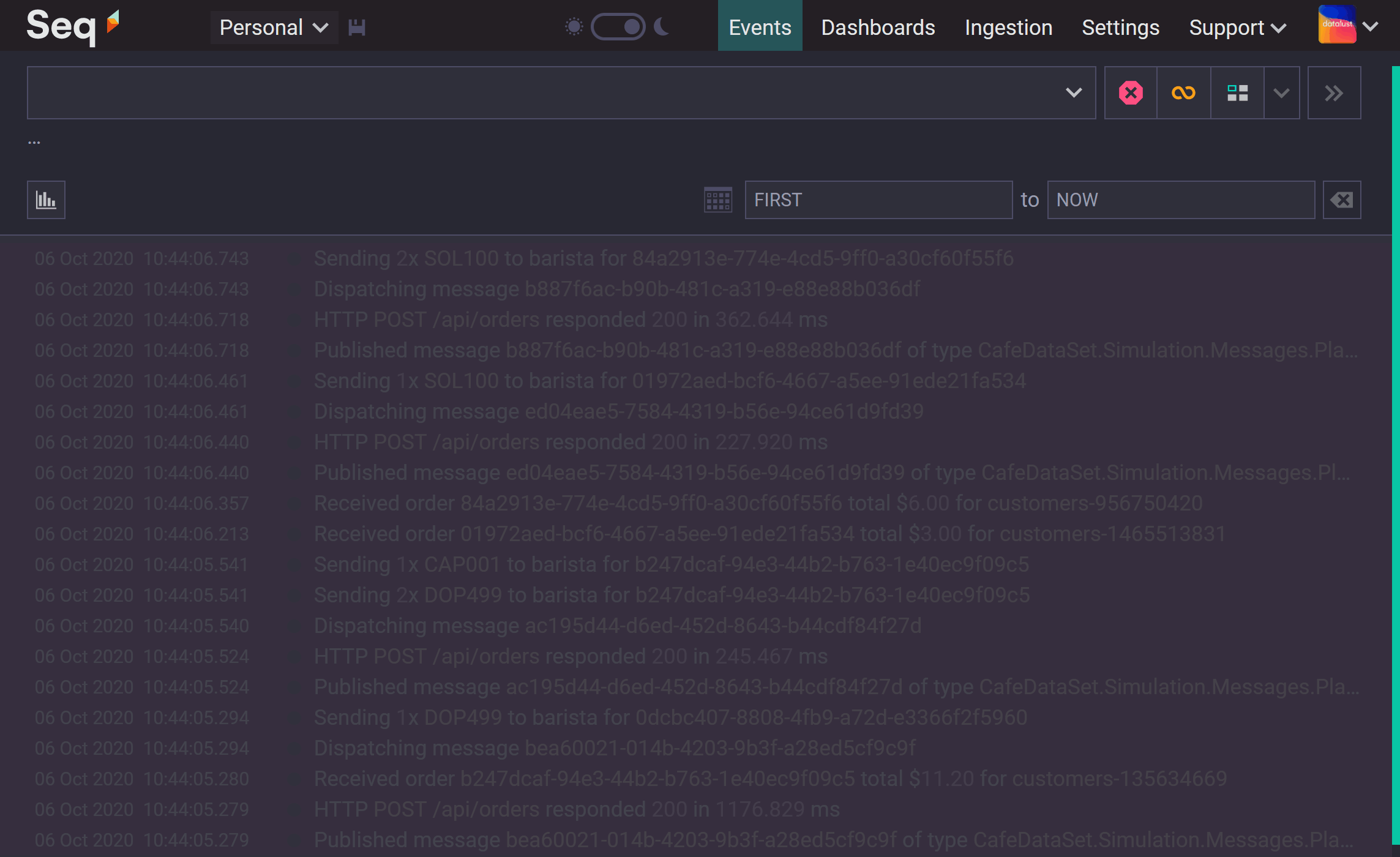
Improved live tailing in Seq 2020.3.
For detailed release contents, see the GitHub milestone.
What's new in 2020.2?
Seq 2020.2 adds an improved structured data viewer that simplifies working with nested objects, and support for SQL-style -- comments in queries and search expressions.
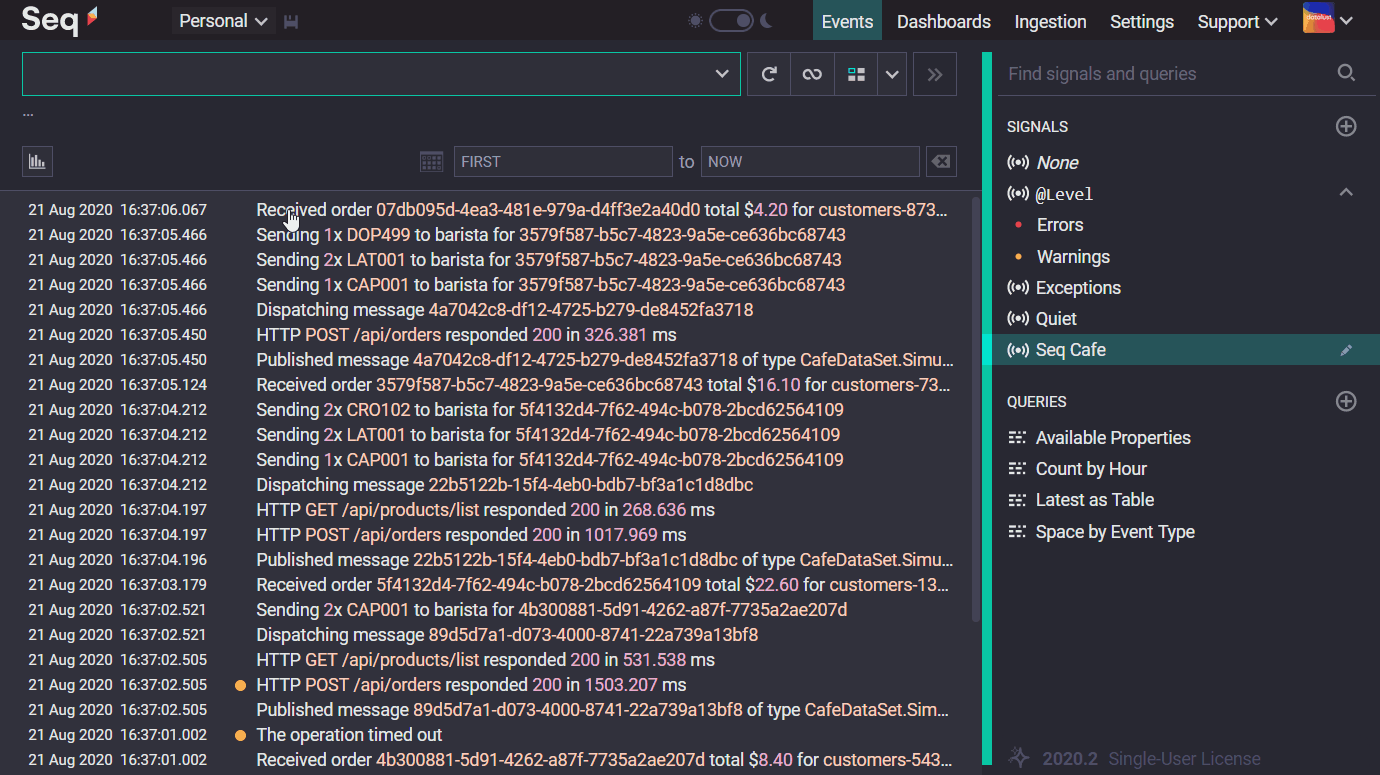
The Seq 2020.2 structured data viewer in action, searching for a value in an array of nested objects.
You'll also find a range of small enhancements and bug fixes.
For detailed release contents, see the GitHub milestone.
What's new in 2020.1?
Seq 2020.1 is packed with improvements over Seq 5.1. We've written this quick introduction to cover the highlights.
The Ingestion screen
Managing log ingestion is the key to controlling costs and optimizing search performance. Seq 2020.1 makes this much, much easier, by providing a detailed breakdown of log traffic from the ingestion API and custom inputs.
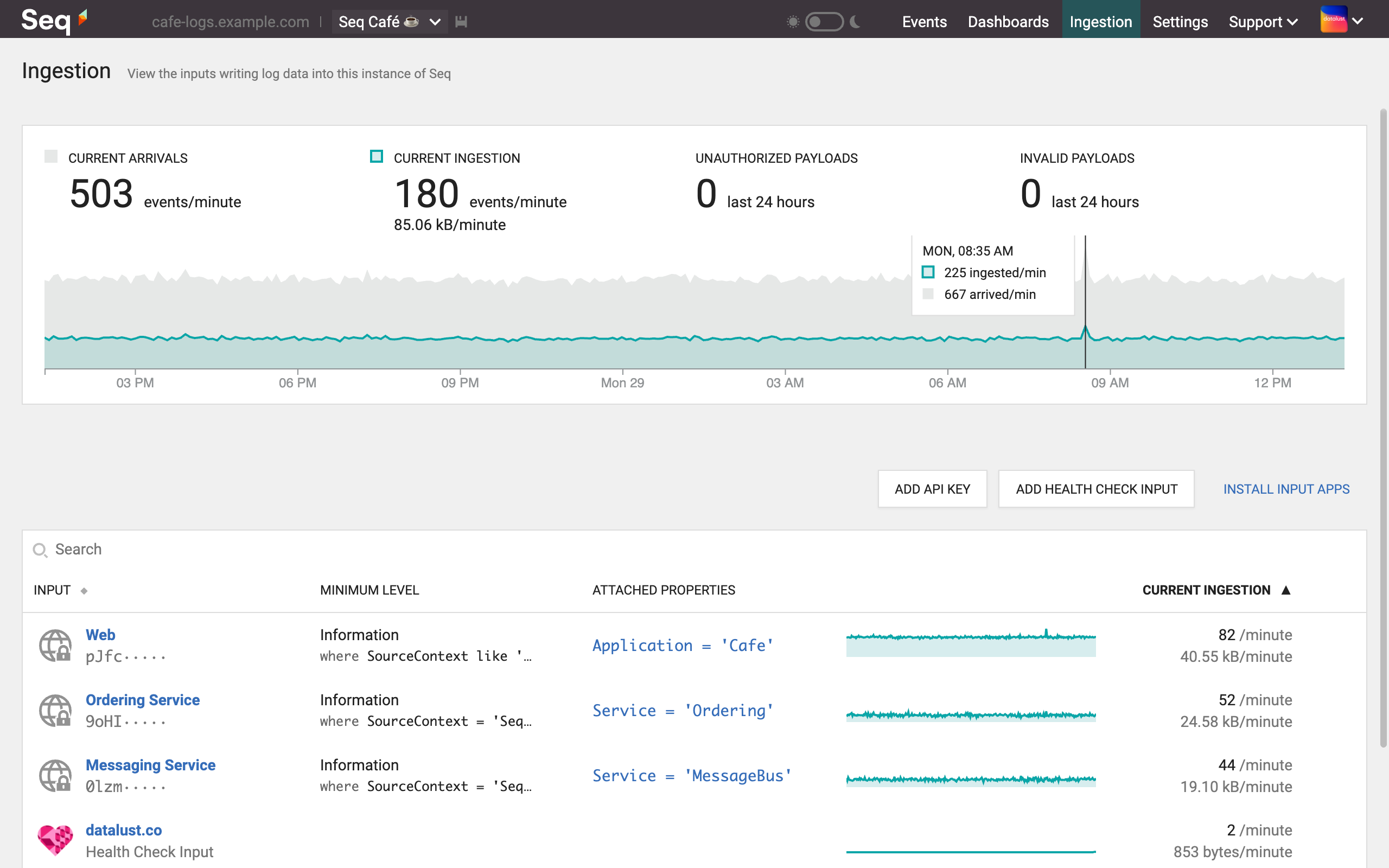
The Seq 2020.1 Ingestion screen.
Learn more about managing ingestion.
OpenID Connect authentication
OpenID Connect is the emerging standard for authentication using OAuth 2.0. Many teams use OpenID Connect providers like Auth0 to implement single-sign-on (SSO), and now Seq can use OpenID Connect to authenticate users, too!
Learn more about configuring OpenID Connect authentication.
Full-featured custom inputs
Custom inputs including GELF, Syslog, RabbitMQ, Health Check, and others, now get all the features of Seq's built-in HTTP ingestion pipeline!
- View the rate of ingestion per input
- Set minimum levels and apply filters to reduce noise
- Use server-allocated timestamps if client clocks are off
- Attach properties to identify events coming from each input
For an example of a very useful custom input, check out the documentation for Health Checks.
Query language improvements
2020.1 continues to improve upon Seq’s query language, making it easier to express a variety of queries. Additions include:
- Universal case-insensitive (
ci) modifier, supporting case-insensitivegroup by, property access, comparisons, and more - Conditional expressions with
if/then/else - Object literals
{a: 'hello', b: 42} - Structural equality comparisons for arrays and objects (like
EventIdin ASP.NET Core!) interval()in queries that group bytime()select *and@Documentnow reflect the underlying JSON data model- Better error reporting for search expressions
- Variadic
coalesce()function -coalesce(A, B, C, ...) Keys()andValues()built-in functions for collection manipulationToJson()andFromJson()for manipulating JSON string dataToUpper()andToLower()built-ins- Column aliases in groupings -
group by A as b
Native, parallel query execution
The underlying query engine in Seq 2020.1 includes a new native implementation in Rust that squeezes more performance from the same hardware.
Pushing more query execution into native code puts less pressure on the .NET garbage collector, leading to lower resource usage, faster execution, and fewer GC pauses.
We've taken advantage of the more predictable query evaluation to also introduce query parallelization, speeding up most queries noticeably.
Set an initial username and password during installation
On Windows, an administrator username and password can now be set during installation through the setup wizard. On Docker/Linux, the SEQ_FIRSTRUN_ADMINUSERNAME and SEQ_FIRSTRUN_ADMINPASSWORD variables (or --default-admin-password-stdin flag) provide equivalent functionality.
Theme switcher
🌞 in the morning, 🌚 in the evening? The quick theme switcher in the 2020.1 navbar makes dark or light mode a single click away.
Revised keyboard navigation
The tab order and focus styles have been improved throughout, making it easier and faster to move between elements in the Seq UI without reaching for a mouse.
Improved administration UI
The administration UI in 2020.1 has had some additional attention.
- View and cancel running queries from Diagnostics
- View and cancel active alerts from all users in the new Alerts tab
- Search API keys by token, prefix, attached properties, etc.
- Filter and sort a selection of frequently-used tables
You can find detailed release notes in our 2020.1 issue tracker milestone.
Updated 5 months ago
Ready to upgrade? Seq 2020.5 is a highly-compatible, in-place upgrade from earlier versions. Most upgrades are as simple as running the installer or pulling the new Docker image, but if you have a custom integration into the Seq API, check out the full compatibility notes for all the details.
